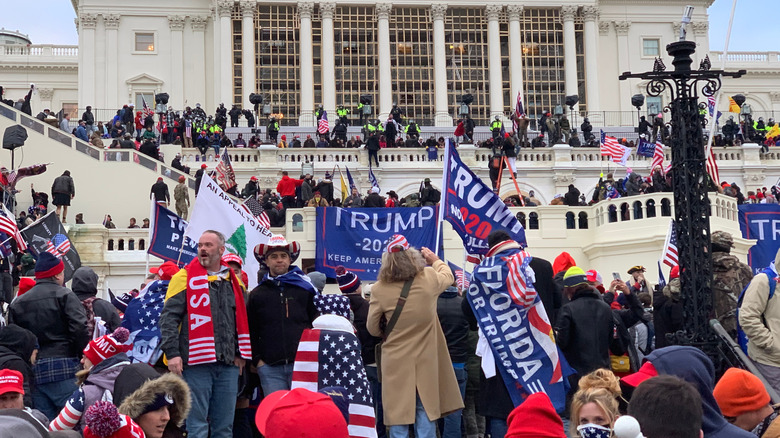What We Know About The Alleged FBI Search Warrant On Trump's Mar-A-Lago Resort
Former President Donald Trump is no stranger to legal troubles. Even before he sought and won the highest office in the land, he had been embroiled in over 4,000 lawsuits over the span of 30 years (via USA Today). Even now, nearly two years since his defeat to Joe Biden in the 2020 United States presidential election, he's still facing legal scrutiny.
As of August 2022, the eyes of the law are focused squarely on Trump's Florida residence, Mar-a-Lago. On August 8, 2022, FBI agents descended on the so-called Winter White House, executing a search warrant. Although nothing has been confirmed by Trump or the FBI, news outlets are speculating the search is in connection to documents Trump took from the White House before he left that he was legally obliged to turn over to the National Archives (per CNN). Even though the motives of the Justice Department aren't known, Trump has put out a statement labeling the search as a political stunt meant to interfere with his potential run for the presidency in 2024, according to CNBC.
Presidential records act
The issue potentially at the heart of this unannounced search by the FBI involves the Presidential Records Act, which mandates that White House records must be turned over to the National Archives when a president leaves office. The National Archives had to travel to Mar-a-Lago this past January to retrieve 15 boxes of documents that legally should have been handed over to them. Among those documents was classified information pertaining to national security, which prompted the Archives to contact the Justice Department (via CNN).
The former president's daughter-in-law, Lara Trump, seems to confirm that missing White House records are at the heart of this issue. She told Fox News that Trump believes this is the likely cause of the search but that he had "every authority" to take them from the White House. However, it's a crime to improperly handle classified documents, and Trump's lawyer, Christina Bobb — who was present during the search — said that documents were confiscated (via NBC News).
More legal troubles
In addition to the missing presidential records, the Justice Department is also investigating Donald Trump in connection to efforts to overturn the election results for the 2020 presidential election. He's also facing scrutiny from a Georgia district attorney over alleged attempts to overturn state election results (via CNBC).
Whether Trump will be charged with a crime in either of these investigations is unknown, but former President Barack Obama's attorney general, Eric Holder, speculated in a radio interview that Trump would likely face criminal charges, first for election tampering in Georgia, and then for actions taken to overturn the election, reports Salon.
Lending credence to Holder's predictions is news that Trump's legal team is in direct communication with the Justice Department. The talks are believed to center around the extent of Trump's executive privilege, particularly if that privilege extends to conversations (via USA Today).
No matter where you sit on the political spectrum, don't hold your breath for anything official to be announced anytime soon. Eric Holder doesn't expect any action from the Justice Department until 2023 (via Huff Post).
Objections and accusations
It should come as no surprise, but Donald Trump himself didn't take kindly to what he described as an "unannounced raid" and an "assault" on his person and property. "After working and cooperating with the relevant government agencies, this unannounced raid on my home was not necessary or appropriate ... Such an assault could only take place in broken, Third-World Countries," he said, continuing, "They even broke into my safe!" (via The New York Times). Trump was in New York at the time of the search, which happened during the morning.
This isn't the first time that authorities have swooped in to seize sensitive documents. In 2007, Donald Keyser, former State Department official, admitted to keeping more than 3,000 documents related to matters of national interest, according to The New York Times, and in 2005, Samuel R. Berger, national security adviser to President Bill Clinton, pleaded guilty to removing classified material from an archive also reported by The New York Times. In related security matters, back in 1999, the C.I.A.'s former chief, John Deutch, was found to be using his personal computer to store information related to national security. He, as The New York Times explains, promptly lost his right to hold onto classified information. Only time will tell if Trump will suffer any similar consequences from the FBI's search.



